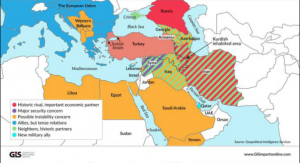It is hard to credit now, but there was a time, only a decade ago, when Turkey described its foreign policy doctrine as one of “zero problems with our neighbors.” But since then, Ankara has burned its boats with Israel over the Gaza Freedom Flotilla; angered Egypt by bitterly criticizing Gen. Abdel-Fattah el-Sisi’s military coup and supporting the Muslim Brotherhood; broken with Syria by assisting anti-Assad rebels (and more recently, invading the country’s northeast, there to forcibly repatriate refugees); and antagonized Saudi Arabia and the United Arab Emirates by siding with Qatar against their embargo.
Now, Turkey is providing direct military assistance to the government of Libya, while the UAE and Egypt—along with Russia—back the rebel army of General Khalifa Haftar. After the failure of cease-fire talks sponsored by Turkey and Russia, President Recep Tayyip Erdogan promised to teach Haftar “a lesson.”
If anything, Turkey’s foreign policy now seems designed to aggravate problems with all of its neighbors.
How did it come to this? In the past 10 years, Turkey has descended from a vibrant Islamic democracy into a repressive authoritarian state. But this doesn’t explain its antagonistic relations with its neighbors: most governments across the Middle East are also repressive authoritarian states with predominantly Muslim populations.
Read more: Bloomberg
Ask me anything
Explore related questions





